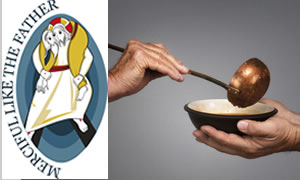


 In outlining the activities that must be undertaken in this Year of Mercy, Pope Francis talks about the need for all Catholics and people of goodwill to open their hearts to those living on the fringes of society.
In outlining the activities that must be undertaken in this Year of Mercy, Pope Francis talks about the need for all Catholics and people of goodwill to open their hearts to those living on the fringes of society.
The Pope says that the uncertain and painful situations of these people and their wounds and anguish should not be met with indifference and apathy, but should elicit from all the response of care, solidarity and compassion.
The Pope says, "Let us ward off destructive cynicism! Let us open our eyes and see the misery of the world, the wounds of our brothers and sisters who are denied their dignity and let us recognize that we are compelled to heed their cry for help! " (MV, 15).
The Spiritual and Corporal Works of Mercy.
Proposing concrete ways of responding to the needs of the poor and needy in society today, particularly, in this Jubilee Year of Mercy, Pope Francis urges us to take up the practice of the Spiritual and Corporal Works of Mercy and says these works are particularly close to his heart. The Pope says that the Corporal and Spiritual works of Mercy are to be resumed in order to "reawaken our conscience, too often grown dull in the face of poverty" (MV, 15).
To "enter more deeply into the heart of the Gospel where the poor have a special experience of God's mercy", the Pope urges all Catholics to rediscover and to practice the seven corporal works of mercy: namely, to feed the hungry, give drink to the thirsty, clothe the naked; welcome the stranger, heal the sick, visit the imprisoned, and bury the dead (Matt. 25:31-45).
He also says we should not forget to practice the seven spiritual works of mercy: to counsel the doubtful, instruct the ignorant, admonish sinners, comfort the afflicted, forgive offences, bear patiently with those who do us ill, and pray for the living and the dead.
The practice of the Spiritual and Corporal Works is one of the ways by which Catholics since time immemorial have observed faithfully, the Church's Season of Lent but in this Jubilee Year, the Holy Father is inviting us to practice these Works of Mercy throughout the Year and not only during Lent.
The Works of Mercy are charitable acts by which we attend to the spiritual and bodily needs of our neighbours. Consequently, the Works of Mercy are classified as Spiritual and Corporal.
The Spiritual Works of Mercy
The Spiritual Works of Mercy flow from the Church's own love for the poor; a love inspired by the Gospel of the Beatitudes (Matt. 5:1-13), the love of Jesus and of His concern for the poor, whether they be in spiritual or material need. The Spiritual Works of Mercy, therefore, are charitable actions and prayers offered to respond to the spiritual needs of a neighbour. They are seven in all, namely,
Admonishing the Sinner: "He who rebukes a man gets more thanks in the end than one with a flattering tongue " (Prow. 28:23; Ezek. 3:19-19; James 5: 20)
Instructing the Ignorant: "... in accordance with the wisdom of your God which is in your possession... instruct those who do not know these laws " (Ezek. 25; Hos. 4:6)
Counseling the doubtful: "... 0 King, take my advice, atone for your sins by good deeds, and for your misdeeds by kindness to the poor, then your prosperity will be long" (Dan. 4:24; John 20:24-29).
Comforting the sorrowful: "Do not let your hearts be troubled. Have faith in God and faith in me..." (John 14:1-2; 11:1-43).
Bearing wrongs patiently: Remember how he endured the opposition of sinners; hence, do not grow despondent or abandon the struggle ... " (Heb. 12:1-4).
Forgiving injuries: "... forgive us the wrong we have done as we forgive those who wrong us." (Matt. 6:12; 5:7, 44-45).
Praying for the living and the dead: "... Pray for one another that you may find healing" (James 5:13¬16; cf. 2 Mace. 12:38-46).
For Pope Francis, it is the duty of each and every Christian to help those around us to escape the difficulties that lead people to despair and make them doubt God and the practice of these spiritual works of mercy help in that regard.
The Corporal Works of Mercy
The Seven Corporal Works of Mercy are deeply rooted in Christ's Sermon on the Last Judgment as found in Matthew 25:34-40, "Come, you who are blessed by my Father. Inherit the Kingdom prepared for you from the foundation of the World. For I was hungry and you gave me food, I was thirsty and you gave me drink, a stranger and you welcomed me, naked and you clothed me; ill and you cared for me; in prison and you visited me. "
Then the righteous will answer Him and say, "Lord, when did we see you hungry and fed you, or thirsty and gave you drink. When did we see you a stranger and welcomed you, or naked and clothed you? When did we see you ill or in prison and visited you? And the King will say to them in reply, Amen, I say to you, whatever you did for one of these least brothers (or sisters) of mine, you did for me".
Following this teaching of Jesus, the seven Corporal Works of Mercy are traditionally defined as:
Feeding the hungry
Giving drink to the thirsty
Clothing the naked
Sheltering the homeless
Visiting the sick
Visiting the imprisoned
Burying the dead
In contrast to the Spiritual Works of Mercy which respond to a person's spiritual needs, the Corporal Works of Mercy attend to a prison's physical needs. In other words, the Corporal Works of Mercy are charitable acts by which one comes to assist in the bodily necessities of one's neighbour. Calling on Christians to this divine duty, St. John of the Cross writes, "If someone who has worldly means sees a brother or sister in need and refuses compassion, on, how can the love of God remain in that person? "
The invitation to Christians to practice the Corporal Works of Mercy is ever urgent and pressing, for we still feel and see in our society, the sting of abject poverty and want; we see many countries in need of financial and technical assistance in order to feed and clothe their people.
Thus, mindful of the words of St. John, it is a prayerful wish that Christians may not close their eyes to such conditions nor condone a policy of apathy or opposition to measures which would help those in need, as the Lord commands, "He who has two coats, let him share with him who has none, and he who has food must do likewise (Luke 11:41)
Conclusion
In this Jubilee Year of Mercy, Pope Francis encourages all Christians to heed the call of the Lord to assist the poor, the needy, the sinner, the ignorant, the sorrowful and the doubtful, by undertaking these Spiritual and Corporal works of mercy.
The Pope says, "We cannot escape the Lord's words to us, and they will serve as criterion upon which we will be judged: whether we have fed the hungry and given drink to the thirsty, welcomed the stranger and clothed the naked, or spent time with the sick and those in prison (cf. Mt. 25:31-45).
Moreover, we will be asked if we have helped others to escape the doubt that causes them to fall into despair and which is often a source of loneliness; if we have helped to overcome the ignorance in which millions of people live, especially children deprived of the necessary means to free them from the bonds of poverty; if we have been close to the lonely and the afflicted,- if we have forgiven those who have offended us and have rejected all forms of anger and hate that lead to violence; if we have had the kind of patience God shows, who is so patient with us and if we have commended our brothers and sisters to the Lord in prayer" (MV, 15).
For Pope Francis, Christ is present in all people but most especially the vulnerable people in our society. He says, "His (Christ's) flesh becomes visible in the flesh of the tortured, the crushed, the scourged, the malnourished, and the exiled ... to be acknowledged, touched and cared for by us " (MV 15).
With the words of St. John of the Cross, "As we prepare to leave this life, we will be judged on the basis of love " (Words of Light and Love, 57), may we encourage one another to practice both the Spiritual and Corporal works of Mercy especially in this blessed Jubilee Year of Mercy and even beyond.


I have been thinking a great deal about my experience at Reconciliation this past Saturday. I felt an intense and unexplainable urge to go and confess my sins when I woke up that morning. I try to go every six weeks or so, but this was no routine visit to the priest for me. I needed to unburden myself of the numerous venial sins I had committed since I last participated in this Sacrament.
Purest Gold: God's Refining Fire in our Lives »
After salvation, many young Christians wonder if there's anything more to their newfound faith than just the security blanket of "being a Christian." Time and time again, God shows himself as a "refiner," and our lives are as gold. God started leading me in this study to understand what He was doing in my life, as well as in the lives of others.
Picking up my pen to write this column, I couldn’t imagine how time flies. Since the last publication of this column I have gone through a lot, especially the loss of my dear mother to whom I dedicate this article. Not only her, but seems I lost a whole generation of my close family.
How to Achieve Business Excellence »
“Do you see a man who excels in his work? He will stand before Kings; He will not stand before unknown men.” Proverbs 22:29
Spiritual Development for our Youth »
Most of us youth in today's fast moving world are easily thrown off by difficulties and worries.
The theme of conversion is a thread that runs all through Lent, but conversion takes on different aspects throughout the phases of Lent. The first two and a half weeks focused on the interior turning of hearts; the liturgy urges the faithful to reflect and examine consciences thoroughly.
Saint Josephine Bakhita »
Feast Day: February 8
Patron Saint Of: Sudan
Saint Josephine Margaret Bakhita was born around 1869 in the village of Olgossa in the Darfur region of Sudan. She was a member of the Daju people and her uncle was a tribal chief. Due to her family lineage, she grew up happy and relatively prosperous, saying that as a child, she did not know suffering.
Catholics Must Fast More Intensely This Lent»
The Norbertine Canons of St. Michael's Abbey have created this digital Lenten retreat so that you can journey through this holy season alongside them. If you want to have one of your best Lenten seasons yet, join us in our Lenten Program "The Great Fast" - https://theabbotscircle.com/the-great-fast-join
When Your Faith Is Put to the Test - Bishop Barron's Sunday Sermon»
Friends, we come now to the Second Sunday of Lent, and we’re on both dangerous and very holy ground with the first reading from the twenty-second chapter of Genesis. The ancient Israelites referred to it as the “Akedah,” which means the “binding”: Abraham binds and is ready to sacrifice Isaac at God’s command.

Copyright © 2002-2024 THE BEACON INTERNATIONAL CATHOLIC MAGAZINE. All rights reserved.
another mc.rufus interactive web design